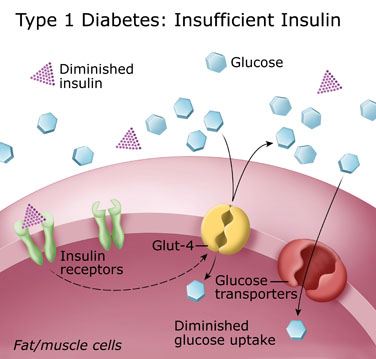There is still much research being done on the progression and cause of diabetes, but this post is a general description of what is known with links for further reading.
Types of Diabetes:
First it is important to know that the sugar you consume is broken into its simplest form, of which the body prefers glucose. In order for body cells to be able to use this glucose for energy, insulin is needed. Insulin is made in the pancreas and then released into the bloodstream as needed (1). There are three types of diabetes:
1. Type I Diabetes
- The pancreas does not produce enough insulin for cells to be able to absorb glucose
- Injections of insulin are needed and blood glucose levels should be monitored frequently (2)
2. Type II Diabetes
- The pancreas can produce enough insulin, but the receptors don't communicate with glucose absorbing transporters
- Previously referred to as "insulin resistance" or "adult onset diabetes", although children are now being diagnosed
3. Gestational Diabetes
- Diabetes can occur during pregnancy, this is why it is important to have proper prenatal care and consult your physician with any concerns
Importance of Carbohydrates:
An important part of diabetes management is understanding the importance of carbohydrates. It is common for those with diabetes to count carbohydrates in number of servings to ensure they are consuming consistently during the day (2).
References:
1. Franz MJ. Medical nutrition Therapy for Diabetes Mellitus and Hypoglycemia of Nondiabetic Origin. Krause's Food and Nutrition Care Process. 2012.
2. Insulin Injections. Medline Plus. 2014.
3. Carbohydrate Counting. American Diabetes Assoc. 2015.


No comments:
Post a Comment